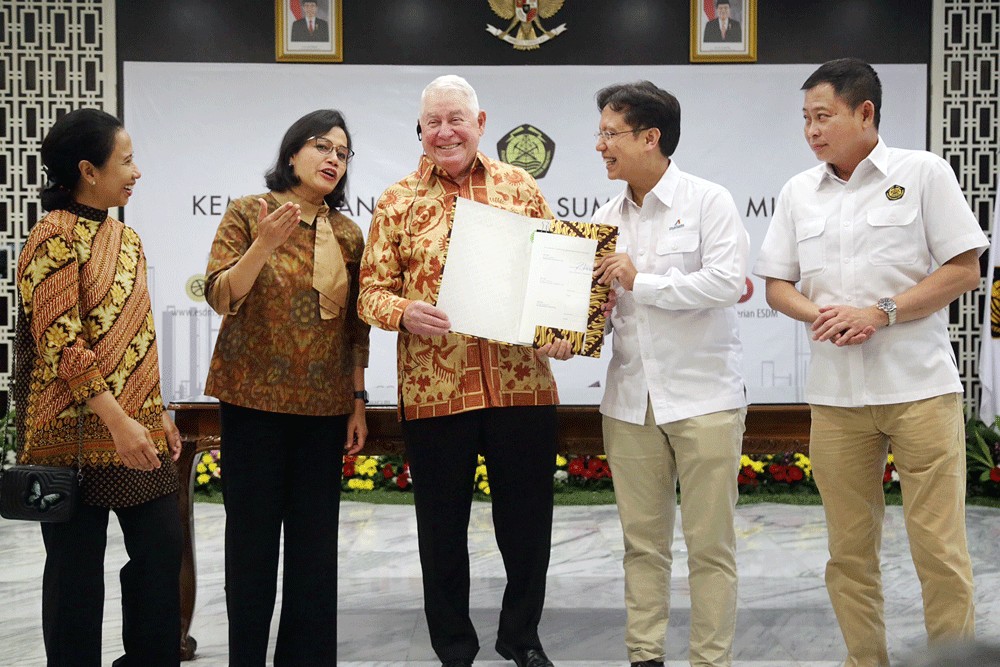Popular Reads
Top Results
Can't find what you're looking for?
View all search resultsPopular Reads
Top Results
Can't find what you're looking for?
View all search resultsFreeport acquisition sealed
Many foreign investors have raised concerns over what they see as mounting resource nationalism.
Change text size
Gift Premium Articles
to Anyone
 Freeport CEO Richard Adkerson (center) and PT Inalum president director Budi Gunadi Sadikin (second right) hold a signed divestment document alongside State-Owned Enterprises Minister Rini Soemarno (left), Finance Minister Sri Mulyani (second left) and Energy and Mineral Resources Minister Ignasius Jonan in Jakarta on Sept. 27. (The Jakarta Post/Wendra Ajistyatama)
Freeport CEO Richard Adkerson (center) and PT Inalum president director Budi Gunadi Sadikin (second right) hold a signed divestment document alongside State-Owned Enterprises Minister Rini Soemarno (left), Finance Minister Sri Mulyani (second left) and Energy and Mineral Resources Minister Ignasius Jonan in Jakarta on Sept. 27. (The Jakarta Post/Wendra Ajistyatama)
A
lmost 10 weeks after the signing of a non-binding heads of agreement, the government — represented by state-owned mining holding company PT Indonesia Asahan Aluminium (Inalum) — and Freeport-McMoRan Inc (FCX) signed three agreements on Thursday to seal the US$3.85 billion acquisition of 51 percent of the giant Grassberg copper and gold mine in Papua.
All parties involved are comfortable with the deal, thereby refuting all the allegations of rising resource nationalism in Indonesia. FCX will still holds 48.77 percent of the mine, with its huge copper and gold reserves, after its earlier contracts of more than 50 years end in 2021. It is therefore not exaggerating to bill the Freeport takeover as the deal of the century.
The United States company will get a license extension for 20 years and is guaranteed fiscal and legal certainty. As a publicly traded company in the US, its shares have virtually been in limbo due to the uncertainty of its operational status. After all, media reports said FCX derived almost 40 percent of its global revenue from the mine.
Papua, which has been a restive region as far as mining operations are concerned, is also content with the deal because the local governments will get 10 percent of Inalum’s shares in the world’s second-largest gold mine.
Many foreign investors have raised concerns over what they see as mounting resource nationalism, especially after the government decided not to renew Chevron’s oil mining contract for the Rokan Block in Riau and the Total-Inpex contract for the Mahakam oil and gas block in East Kalimantan.
More encouraging is the fact that negotiations about the technical details of the management and operation of the mine will most likely be smooth because both Inalum and FCX have agreed on a 20-year fixed business plan for the mine until 2041 when they signed the heads of agreement last July.
Most important is that the risk of disruption to production, like what happened at the Mahakam oil block after Pertamina took over it early this year, will be very small. The US company will continue to be the main operator as mining will go underground and become more complex. It has also agreed to build a smelter to resolve environmental issues.
This means the hardest part of the process has been completed and the remaining negotiations will cover mostly technical and administrative matters for the management and mining operations, the fiscal treatment, the conversion of the contract into a special mining license based on the 2009 Mining Law and the construction of a smelter.
The main challenge for Inalum during the transition period within the next few years is to build up a comprehensive understanding of the mining operations, especially as the bulk of the mine’s reserves are now underground. Inalum should be able to prove — through good corporate governance, high standards of transparency and accountability — that an Indonesian-owned Grasberg mine will produce more benefits for the people than when it was under US corporate control.









